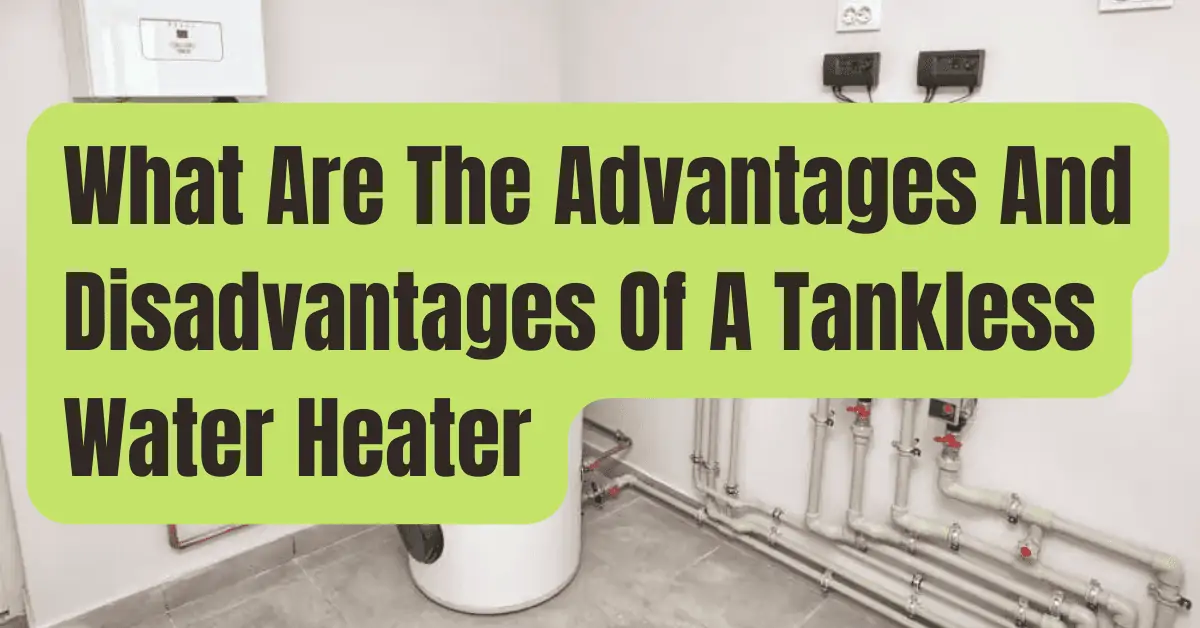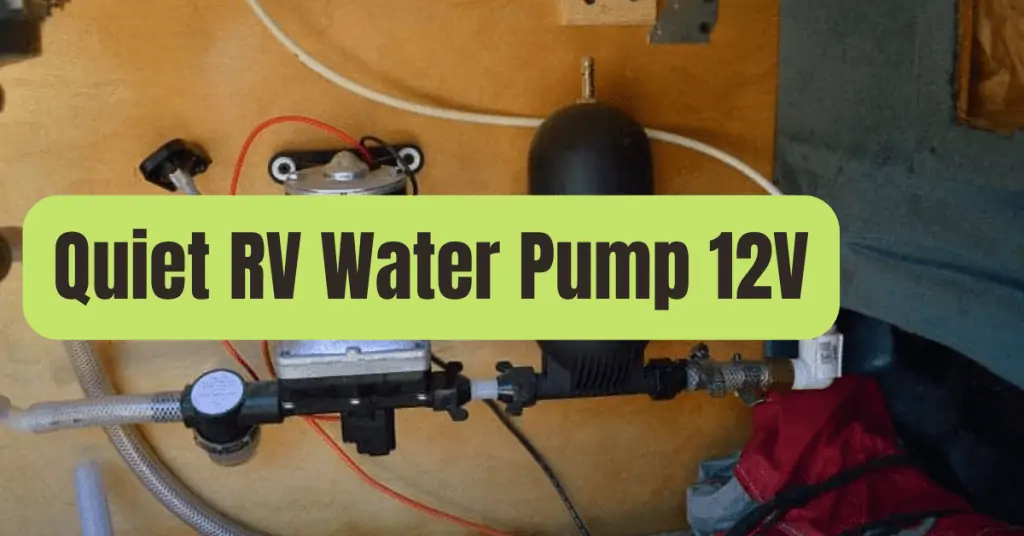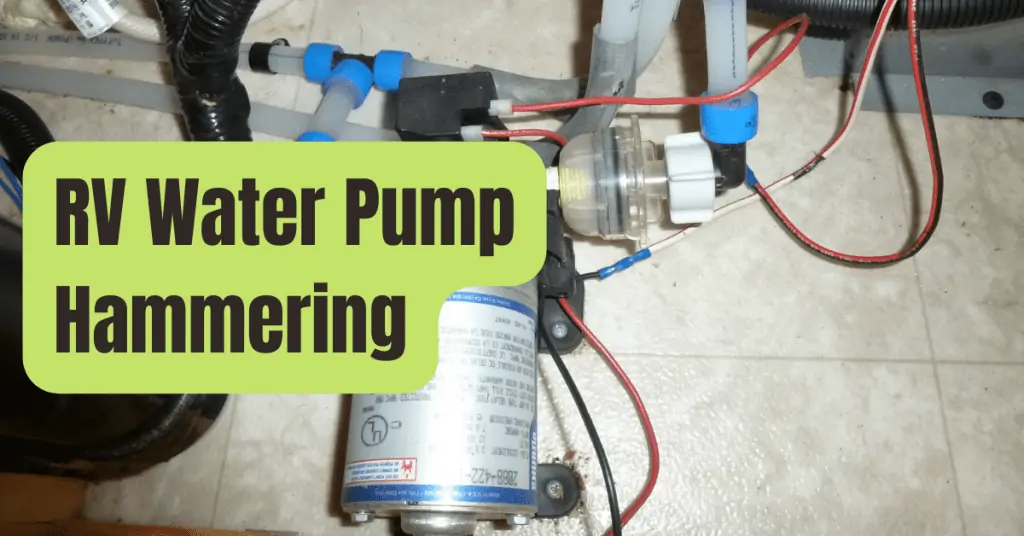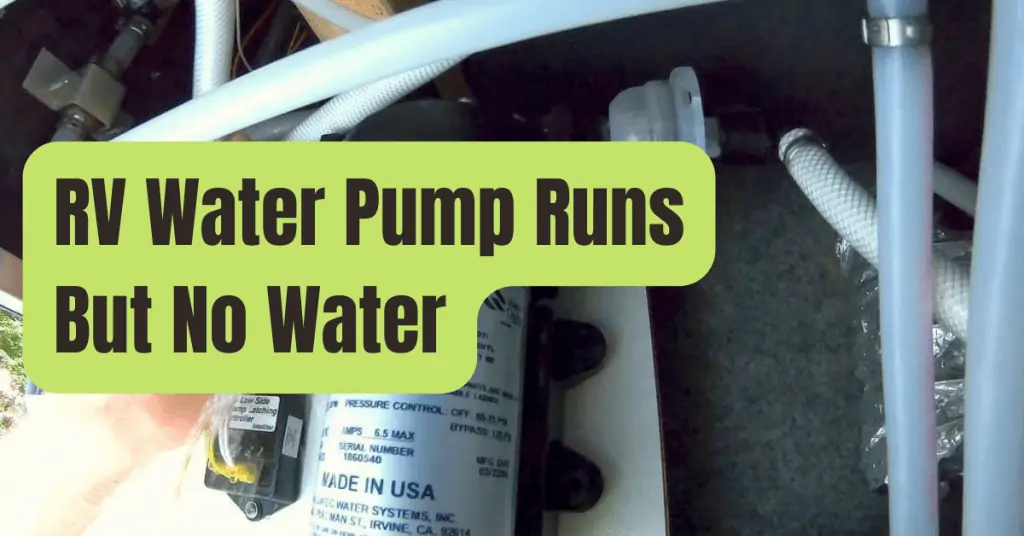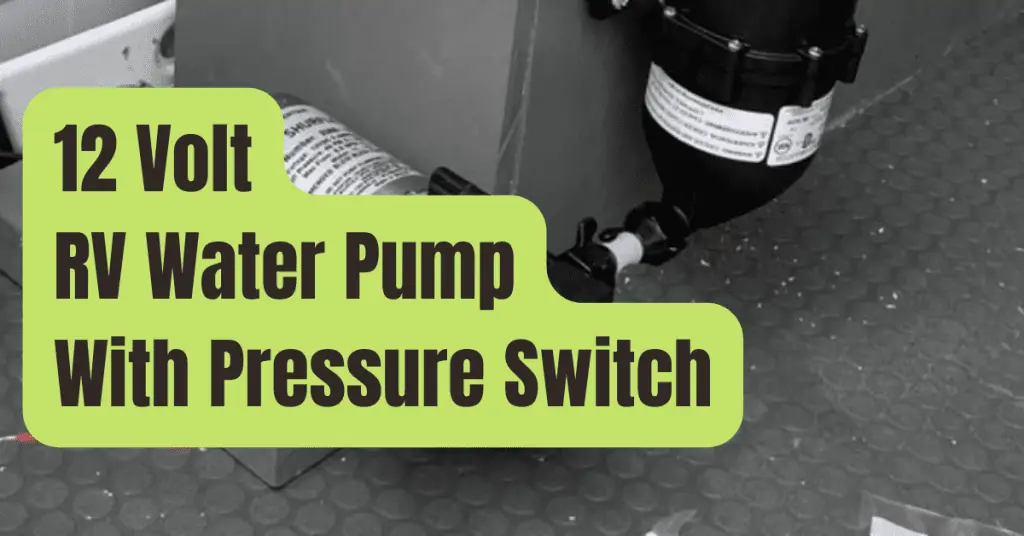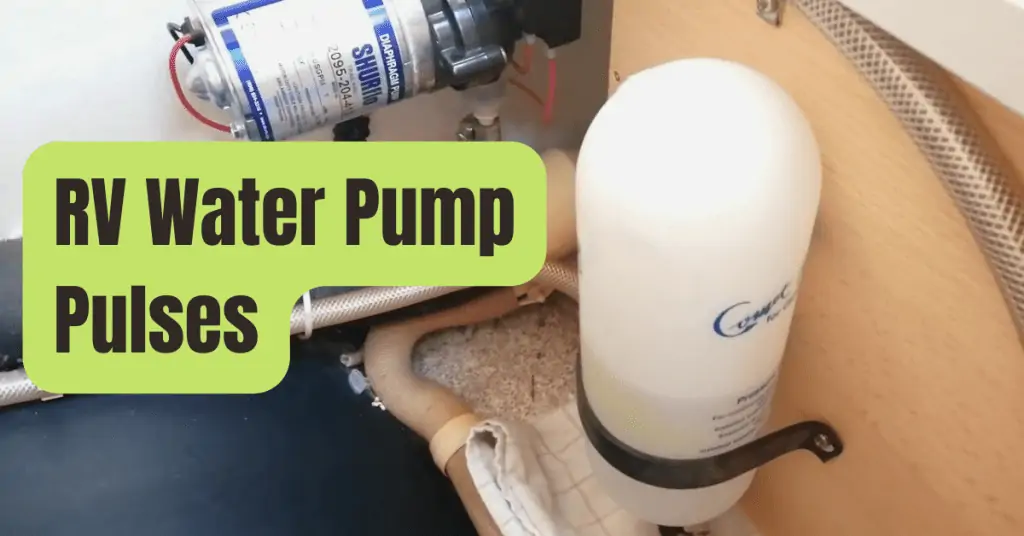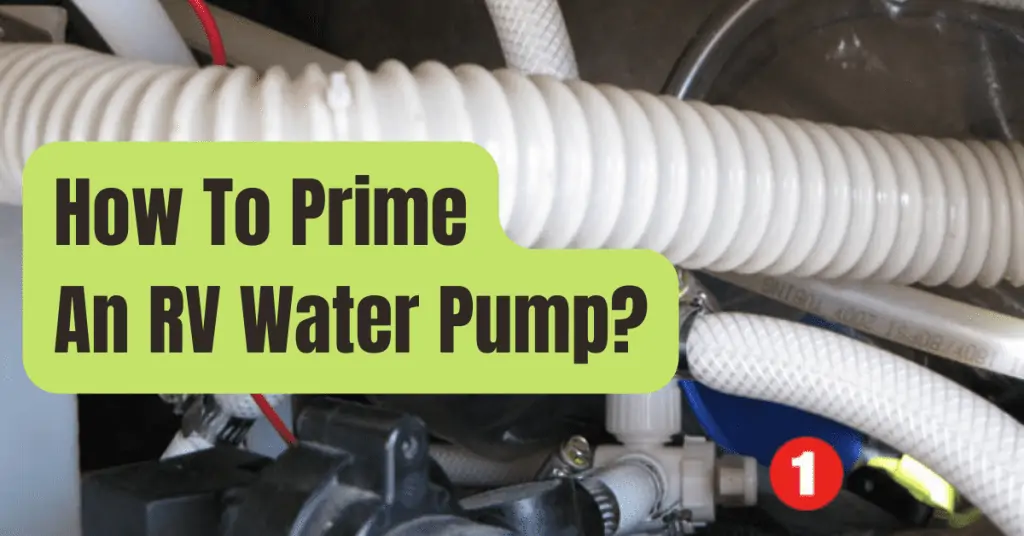Tankless water heaters, also known as on-demand or instant water heaters, offer several benefits over typical water heaters with tanks and may be a great long-term investment because of these advantages.
Tankless water heaters are also known as on-demand or instant water heaters.
However, just like any other product, they come with a few drawbacks, and they are not the best option for every single household.
Tankless water heaters are more efficient than conventional water heaters with storage tanks because they only consume energy when a hot water faucet is turned on or when other appliances in the home are in use.
Traditional water heaters require energy continually to keep a hot water supply going.
Their ability to save money and energy as a consequence of their on-demand mode of operation is their most important competitive advantage.
Tankless water heaters provide a number of advantages over their more conventional counterparts, including cost and energy savings, as well as a variety of additional advantages.
Tankless water heaters provide an unlimited supply of hot water, take up less space, have a reduced chance of leaking, are safer, and have a substantially longer lifetime on average than conventional water heaters.
Tankless water heaters also have a smaller environmental impact.
The upfront cost of tankless water heaters (both the unit and the installation) is much greater than the cost of tank-style heaters.
This is the primary drawback of tankless water heaters.
When installation is included in, the average cost of a tankless water heater is three times more than the cost of a tank-style water heater.
When opposed to traditional water heaters that store hot water in tanks, tankless water heaters have a number of drawbacks in addition to their high installation costs, including the following:
- They take much longer to provide hot water.
- When using a number of different outlets at the same time, the temperature of the water is unpredictable.
- In the event that the electricity goes out, they will not be able to deliver hot water.
Before coming to a conclusion on whether or not to purchase a tankless water heater, it is important to gather as much information as possible about the many aspects of the product.
You will be able to make a well-informed choice based on your specific circumstances after reading this post since I present a detailed overview of the benefits and drawbacks of tankless water heaters.
Let’s get right into it.
You may go to a certain section by using the links provided below.
Pro: Long-Term Cost Reductions And Energy Efficiencies
The fact that tankless water heaters are more cost- and energy-efficient over the long run is the primary benefit of investing in one of these systems.
A water heater that is in the form of a tank consumes energy 24 hours a day, seven days a week to keep a 40- to 50-gallon water supply at the desired temperature so that hot water is available whenever it is required.
Tankless water heaters heat water just when it is needed and do not keep a supply of water on hand, just as their names imply.
Tankless water heaters don’t incur standby heat loss since they only heat water when it’s required to be heated.
Standby heat loss is what happens when heat departs the water tank and has to be constantly reheated.
When a hot water source, such as a faucet, shower, or appliance, is switched on, cold water flows through the tankless water heater, where it is heated by a gas-fired burner or electric coils, depending on the model.
Once the water has been heated, which takes just a few seconds, the hot water will flow through the pipes in your house until it comes out of the faucet, showerhead, or any other outlet that you have.
Therefore, how much energy are you going to save?
Your ability to save money on energy relies, among other things, on how much water you go through and how effective your old tank-style system was.
The Department of Energy in the United States estimates that tankless water heaters may be between 8% and 50% more energy-efficient than traditional water heaters with storage tanks.
However, the actual efficiency of tankless water heaters is dependent on the volume of hot water that is used.
Tankless water heaters are 24–34% more efficient than tank-style water heaters for households that consume less than 41 gallons of hot water on a daily basis.
Tankless water heaters are only 8% to 14% more efficient than conventional water heaters when the user requires a high volume of hot water (about 86 gallons per day).
This is because tankless water heaters operate more often.
You can save even more money—between 27% and 50%—if you install tankless water heaters at each outlet (shower/sink) rather than a centralized system for your whole home.
This will allow you to take use of the full potential of the system.
Pro: The Availability Of An Infinite Supply Of Hot Water
Consider the following scenario: you and your family have just returned from a day at the beach, and everyone in the house has to shower.
After you’ve had four consecutive showers, the hot water starts to run out, and you’re the one who has to take a shower in the cold.
If you do not ever find yourself in such predicament, you should strongly consider investing in a tankless water heater.
Let me clarify.
Each tankless water heater has a limit flow rate; to put it another way, they can only heat a certain volume of water at one time.
In other words, they do not have a storage tank.
The majority of tankless water heaters won’t be able to keep up with the water demand of five showers operating at the same time.
Tankless water heaters, on the other hand, may offer an infinite supply of hot water so long as the flow rate of water that is being used at any particular moment is lower than the maximum permissible flow rate.
Because tankless water heaters work by heating water from an external source on demand, you could take a shower for 10 hours (or longer) and the water would still be as hot as it would be for a 10-minute shower.
Tankless water heaters are more energy efficient than traditional water heaters because they only heat the water they need.
Pro: They Take Up Less Room.
Tankless water heaters provide a significant advantage to homeowners who are pressed for living space in their homes.
Tank-style water heaters often have to be affixed to the wall, while tankless water heaters take up a substantially less amount of physical area overall.
A tank-style water heater that holds 40 to 50 gallons of water typically measures between 54 and 60 inches in height, has a diameter of 20 inches, and is shaped like a cylinder.
This information is provided to give you an idea of how tankless water heaters compare to tank-style water heaters in terms of size.
The typical dimensions of a tankless unit are a rectangle with height of about 27 inches, width of about 18 inches, and depth of about 10 inches.
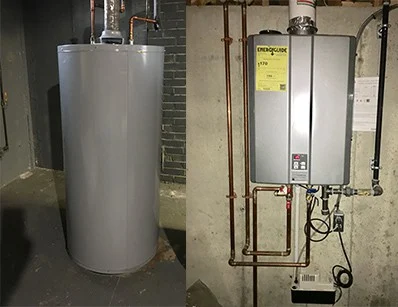
Tank-style heaters need more floor space and are often placed in the basement.
Tankless heaters, on the other hand, are fixed on the wall similar to a circuit breaker and can be stored in almost any closet.
Pro: Lower Potential for Damage Caused by Leaks and Water
One of the most significant dangers associated with water heaters that use tanks is the accumulation of minerals from hard water over time, which may cause corrosion and, in the end, leaks in the tank.
Because they lack a storage tank, tankless water heaters eliminate the possibility of water damage caused by leaking or flooding.
This does not imply that tankless water heaters are completely free from problems, though.
They can and will run into difficulties that might result in leaking, but the likelihood of having a huge leak that floods your whole basement and causes severe damage is quite low.
They can and will run into problems.
Pro: There Is No Possibility Of The Tank Exploding.
The current plumbing code mandates that all water heaters that use a tank must be equipped with a temperature and pressure relief valve.
This valve is designed to open should the tank’s internal pressure become too great, therefore preventing an explosion.
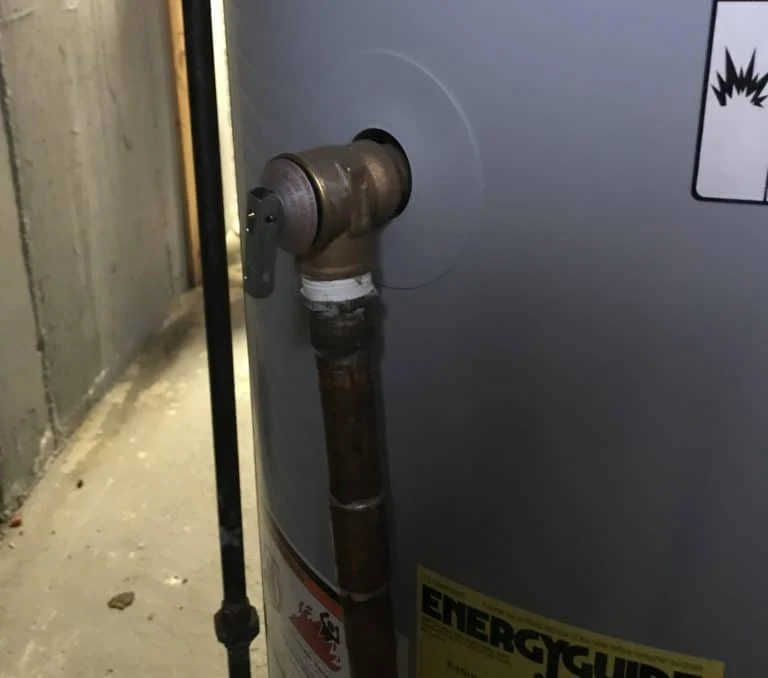
Minerals and sediment found in the water have a tendency to accumulate over time and clog up the valve, preventing it from performing its intended purpose.
When anything like this takes place, a potentially life-threatening amount of pressure might build up, putting you in danger.
Watch this video to discover how to test the valve on your tank-style water heater at least once per year as recommended by water heating specialists.
Explosions are a very real danger that come with tank-style water heaters, even if they don’t happen very often.
Tankless water heaters, on the other hand, do not have a tank, therefore there is no potential for an explosion to take place even if one were to take place.
That’s one less thing you have to worry about.
Pro: Burns And Toxic Metal Exposure Are Less Likely To Occur, Which Is A Definite Plus.
There is consensus amongst many authorities that tankless water heaters provide a more secure alternative to their tank-style counterparts.
They not only do not have a tank that may explode, but they also give more exact control over the temperature, reducing the likelihood that you will be burnt by hot water.
In addition, as I noted earlier, tank-style water heaters deteriorate over time because hard water causes the inside lining of the tank to rust and corrode, which ultimately leads to the heater breaking down.
These minerals and particles will, in due time, find their way into your water lines, putting your family in danger from the hazardous poisons they contain.
Because tankless water heaters do not store water in a tank, which may corrode over time, the water that is distributed around your house by these heaters is cleaner and less likely to cause irritation to your skin.
Pro: Life Expectancy of Greater Than Twenty Years
I just just had an article published in which I discuss how long water heaters typically last as well as provide information on how to make your water heater last longer.
However, tankless water heaters often have a lifespan of over 20 years, while tank-style water heaters typically only last between 8 and 12 years on average.
Purchasing a tankless water heater is a smart investment if you already live in your “forever home” or if you intend to remain in the same location for an extended period of time since it will save you from having to buy a new one for a very long time.
Con: High Initial Costs For Both The Unit And The Installation
The high initial cost of both the equipment and the installation is by far the most significant drawback associated with tankless water heaters.
The increased cost of tankless water heaters is mostly attributable to their more involved installation processes.
In many cases, specialized wiring must be built in order to manage the additional load, and/or a new vent pipe must be set up in order to accommodate the expansion.
Additionally, due to the fact that tank-style heaters have been around for a longer period of time and are more widespread, there are more specialists who are capable of installing them, which results in cheaper labor expenses.
In addition, tankless water heaters may be made to work harder by hard water, which is defined as water that has a high concentration of minerals.
Eventually, this might lead to the unit’s failure.
Because of the potential for damage caused by hard water, several manufacturers stipulate that in order to maintain the validity of the warranty, you must also have a water-treatment system installed.
The inclusion of this supplementary component will result in an increase to the total cost.
Make use of the resources provided below to examine the cost differences between some of the most common tank and tankless water heaters.
It is important to note that the installation is not included in these rates.
Con: Take Longer to Deliver Hot Water
When opposed to heaters with tanks, tankless water heaters have the additional drawback of producing and delivering hot water at a later time.
This is another another disadvantage of tankless water heaters.
It is important to bear in mind that tankless water heaters do not maintain a supply of hot water that is ready to flow instantly when it is required.
When you turn on a hot water faucet, the water that is sitting in the pipes prior to the tap being turned on is either cold or, at best, at room temperature.
Once the cold water has been drained out, the hot water will start to stream through; however, the amount of time it takes may range anywhere from a few seconds to a minute depending on how far the heater is from the tap.
Tank heaters don’t create hot water instantaneously either, but since they have a supply ready to go and don’t need to turn on, the water is delivered to the outlet much more rapidly.
Tank heaters are the most common kind of water heater.
Con: The Iced Tea and the Sandwich
During your investigation on tankless water heaters, you have probably come across the phrase “cold water sandwich.”
When you use hot water in bursts, you may experience what is known as a “cold water sandwich.” This happens when you feel an initial rush of hot water, which is then followed by cold water, which rapidly becomes hot again.
When you rapidly turn off the hot water and then turn it back on again, such as when you are washing dishes by hand, the pipes still contain hot water in them from only a few seconds earlier.
Because there is a momentary lag between the time the water starts to flow and the time the heater turns on, there is a momentary surge of cold water before the water begins to heat up.
If you aren’t used to the feeling, the cold water sandwich can throw you off if it happens to you.
This isn’t a huge problem, but it might.
Con: When Using Many Faucets, Showers, Or Appliances At Once, The Water Temperature Might Become Inconsistent.
Earlier on in this piece, I discussed the situation in which you and your family have just returned from a day at the beach, and everyone has to take a shower.
In a situation like this one, the advantage of having a tankless water heater is that it allows you and your entire family to take showers in rapid succession without having to worry about running out of hot water.
Tankless water heaters have one major drawback, which is that they cannot keep up with demand when there are numerous people taking showers at the same time.
Not only is this a problem with showers, but depending on the size of your water heater, you may also have difficulties if you run both a shower and the dishwasher at the same time.
When you are in the market for a tankless water heater, the flow rate is the most important indicator for you to pay attention to.
The quantity of water that a tankless system is able to heat in a certain length of time is referred to as the flow rate.
It is expressed in gallons per minute, also known as GPM; the higher the GPM, the greater the volume of water that can be heated at the same time.
You may get a sense of the typical flow rates for each kind of outlet by looking at the graphic that follows.
| Outlet | Average Flow Rates (GPM) |
|---|---|
| Bathroom Faucet | 0.5 – 1.5 |
| Dish Washer | 1 – 1.5 |
| Kitchen Faucet | 1.5 |
| Washing Machine (Clothes) | 1.5 – 3 |
| Shower | 2.5 – 3 |
| Tub | 4 |
In a nutshell, tankless water heaters are available in a wide variety of sizes, some of which are designed to service homes that use a great deal of water while others are more compact and are intended for reduced water consumption.
It is essential to evaluate the requirements of your home and get a heater of the proper size for that space.
It is important to keep in mind that the flow rate capacity of your water heater will be exceeded if you simultaneously use an excessive number of faucets, showers, or appliances, and as a result, the water will not be hot.
This handy guide will assist you in determining the capacity of the tankless water heater that best suits your needs.
Con: It Is Difficult to Achieve a Temperature That Is Lukewarm.
One of the disadvantages of tankless water heaters that is not well recognized is the fact that it is difficult to heat the water to a temperature that is lukewarm.
There is a difference between absolutely cold water and the warmest water that can be produced by mixing hot and cold water together, and this difference is due to the fact that tankless water heaters need a minimum quantity of water flow before being active.
It’s not the end of the world since there are very few circumstances in which you won’t be able to achieve the temperature you need, but if you’re the kind of person who truly appreciates taking chilly showers, you should be aware of this potential issue.
Con: In The Event That The Power Goes Out, You Won’t Have Access To Hot Water.
When a storm rolls through and knocks out the electricity in your house, it also turns off the heater that keeps your water hot.
Electricity or gas may be used to power tankless water heaters; however, even gas-powered tankless water heaters need an electric control panel in order to function properly.
Tankless water heaters do not have storage tanks.
In the event that the power goes out, you will not have any hot water available to use since tankless water heaters do not store hot water in a tank.
Tank-style water heaters offer a considerable benefit over tankless heaters in this regard.
Tankless heaters do not have a storage tank.
The water that is kept in their tank will maintain its temperature for many days even if they switch the power source.
The Bottom Line: Is It Worth It to Invest in a Tankless Water Heater?
Tankless water heaters offer a number of benefits that are not found in the more conventional water tank-style heaters.
They reduce your energy consumption, which in turn saves you money, they provide you with a limitless supply of hot water, they are tiny and compact, they never leak, and they do not add potentially hazardous metals to your water supply.
The best part is that they have a lifespan that is two times longer than tank-style water heaters.
Conducting a thorough review of your circumstances is the most effective method for determining whether or not a tankless water heater will be beneficial for your home.
Here are some easy things to ask yourself:
Do you have three thousand dollars to spend on an appliance that won’t provide you a return on your investment for a number of years?
Do you live in a home that was recently built, or do you intend to remain in the same house for at least ten more years?
If you take many showers in a row, do you find that you often run out of hot water?
Would you be able to make better use of your home if it had more room in the basement?
If you responded “yes” to any one of these questions, it’s possible that a tankless water heater may be the best option for your home.
If you responded “no” to one or more of these questions, particularly question #1, it is highly recommended that you postpone this decision and continue using a heater of the tank kind.

